GHOST LAB (2021)
After witnessing a haunting in their hospital, two doctors become dangerously obsessed with obtaining scientific proof that ghosts exist.

After witnessing a haunting in their hospital, two doctors become dangerously obsessed with obtaining scientific proof that ghosts exist.


Paween Purijitpanya’s exceptionally un-chilling, uninteresting second feature has a promising enough premise: two scientists, seeking to prove the existence of ghosts, set out to find them and inevitably get more than they bargained for. But anyone hoping for a quasi-realistic tale of scientific ghost-hunting, as depicted so thrillingly in J.A Bayona’s The Orphanage (2007), for example, will be sorely disappointed by Ghost Lab. It spends much of its time didactically expounding rather thin and undeveloped ideas about the spirits of the dead, only occasionally remembering to inject a dose of plot.
Dr Gla (Paris Intarakomalyasut) and Dr Wee (Thanapob Leeratanakachorn) are young friends and hospital doctors in Thailand, despite being very different men. Gla is handsome and arrogant, while Wee (whose full name appears to be, rather implausibly, Dr Cheewee Prometheus) is much less socially confident. Gla is also interested in “freaky things”, but Wee is uber-rationalist, and the type of person who cites CERN and photons.
The “freaky things” include ghosts, of course. Gla believes he briefly saw his father’s spirit when he was a young boy, and has come to the conclusion that trying to record ghosts using electronic means (like camera surveillance) is futile. There’s so much video-recording these days that if ghosts could be captured that way we’d be awash in footage. Instead, Gal argues, to prove they exist, he and Wee need to conjure them up physically. (If you see flaws in the logic here you’re not alone.)
For a while the pair nose around their hospital hunting for hauntings—without results that could be described as even slightly frightening, although one early apparition is at least disquieting in its jerky movements—before they theorise that ghosts are most likely to reveal themselves to people they knew in life. (They come to this realisation after Wee makes the observation that all the ghosts they’ve encountered could be divided into those of people they knew, and people they didn’t; and in Ghost Lab this statement of the blindingly obvious counts as astute insight.)
Therefore, they toy with befriending a dying young woman, and Wee’s mum conveniently passes away too, but still they’re not satisfied with the quality of ghosts they’re getting. The logical next step is for one of them to “cross over” and participate in their experiments from ‘the other side’.
Things immediately get more interesting, for a while, but before long things are dragging again. Nothing in Ghost Lab is substantial enough to justify the almost-two-hour runtime, perhaps explaining the bizarre miniseries-style recap at around 50-minutes of all that’s gone before. Maybe the filmmakers were worried audiences might have lost interest? A final twist wraps things up in a way that suggests Ghost Lab had aspirations of an emotional dimension all along, but that wasn’t really been explored beforehand, and the twist isn’t unpredictable either.
The two male leads tend to chew scenery (especially Intarakomalyasut with his Incredible Hulkish glower), although Leeratanakachorn does handle quieter moments well. But by far the best actor in the film is Nuttanicha Dungwattanawanich as Mai, Gla’s girlfriend, who has the all-important ability to convince us her character exists outside of the events we’re witnessing. An uncredited older cast member as Gla’s mother is also briefly powerful.
Purijitpanya’s direction and the cinematography by Pithai Smithsuth is competent, with thoughtful and varied angles and compositions, while the VFX team contribute some striking set-ups involving invisible ghosts. The score by Bill Hemstapat is assertively trite, however, and an even more damaging problem lies with the screenplay…
Either the writing itself, or the subtitled translation, is awfully plain and flat. It never feels like real colloquial dialogue, more a bland official statement. The not infrequent resort to speech-to-video-camera reinforces this impression that Ghost Lab is telling the story rather than immersing us in it, as do frenetic insertions of non-diegetic elements as if they were picture-book illustrations: a character mentions a platypus, or a planet, and a moment later we’re shown one.
These seem like desperate attempts to add stimulants to a film that frequently consists of Gla and Wee standing around telling us their experiment is proceeding to its next stage. We’re left largely in the dark as to what they actually do (like how they detect or arouse the ghosts) or what they’re learning about ghostly behaviour.
There’s little reason to care about the two leads as individuals, since they seem to lead minimal lives beyond or before this sophomoric ghost-obsession, and the suspense the movie’s striving for is weak: would any viewer really imagine that once one of the doctors has committed suicide, he won’t eventually manifest as a ghost?
Ghost Club is apparently the first Thai film to premiere on Netflix. One can say with reasonable confidence the next should be better, but in the meantime, Bill Murray and Dan Aykroyd don’t have too much to worry about.
THAILAND | 2021 | 117 MINUTES | 2.39:1 | COLOUR | THAI
director: Paween Purijitpanya.
writers: Vasudhorn Piyaromna, Paween Purijitpanya & Tossaphon Riantong.
starring: Thanapob Leeratanakachorn, Paris Intarakomalyasut & Nuttanicha Dungwattanawanich.
